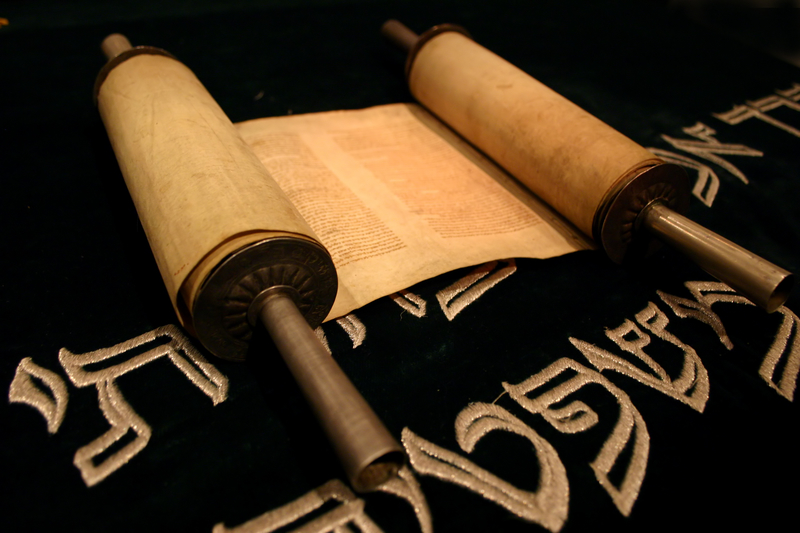
The Covert Recitation of Baruch Shem
Yaakov asks his sons to assemble and gather themselves in order to reveal the אחרית הימים - The Zohar explains that this is not to be interpreted merely as Yaakov's desire to tell them the date that coincides with the end of days - but rather it was his intent to free or reveal the שכינה from its spiritual husk in order to usher in the messianic era. The שכינה is the lowest channel - or the אחרית - the ultimate spiritual reservoir of the world of אצילות - The twelve sons (except Yoseph) of Yaakov were all associated (Zohar 1:240) with this spiritual level.
In explaining the details of this gathering - The Talmud (Pes 56) teaches that Yaakov desired to reveal to his sons the קץ הימין - The Zohar (1:234) maintains that there is a קץ associated with holiness or the right and a קץ associated with unholiness and the left. The latter קץ השמאל - represents a husk that surrounds the former and nourishes from it. This קץ הימין is a code for the שכינה - Yaakov's intent was to remove this קליפה permanently - to reveal the Holy שכינה - If it would be revealed now - maybe they could avoid an extended stay in the exile of Egypt - as the גלות is a reflection of the שכינה being surrounded by the קליפות.
We know that both the exile and redemption of Israel goes hand in hand with that of the שכינה - (Meg 29) - The Talmud teaches that his attempt was apparently thwarted - maybe it was not yet time - Nevertheless we still have a responsibility - as the servants of the שכינה to provide her with the שפע from above even in the face of her being surrounded by the קץ השמאל - A close reading of the narrative from Pesahim will reveal how we are to provide the שכינה in גלות or outside of her home - the שפע she needs. This will be accomplished via the covert reciting of ברוך שם כבוד מלכותו לעולם ועד - until the קץ הימין is fully freed from the קץ השמאל.
Yaakov's Attempt to Reveal
It behooves us to examine through a mystical lens the Talmudic expansion of the Torah narrative describing what occurred as Yaakov called upon his sons to gather prior to his passing in our parasha. The Gemara (Pes 56) inquires as to the insertion of the non biblical liturgical addition of ברוך שם כבוד מלכותו לעולם ועד - said between שמע - and ואהבת - Rish Lakish Explains the event - Then Yaakov called his sons and said - Gather together and I shall tell you ... Yaakov wished to reveal to his sons the שכינה called the קץ הימין - His attempt was thwarted and the שכינה - Divine Presence departed from him. He claimed - Perhaps Heaven Forbid there is a blemish amongst one of you - as not being spiritually fit to be part of the celestial chariot or entourage of the Divine Presence.
Maybe my children still retain a vestige of the קץ השמאל - amongst them - so the קץ הימין - has departed from us. Maybe the קץ השמאל is still attached to my seed as it was with my forefathers - As evidenced by Abraham who had Ishmael and my father Isaac who had Esav. His sons answered him that indeed his efforts to remove from himself and his seed any vestige of the קץ השמאל - was successful and is not the reason for the departure of the שכינה - They proceed to show Yaakov that they are parties with him in the redemption.
They proceed to draw down שפע - from above to a preparatory stage prior to its entrance into the spiritual reservoir or that of the שכינה - This came about as they recited שמע ישראל - At that point Yaakov had the wherewithal to bring down the שפע - even further towards its ultimate destination or the שכינה - via his recital of ברוך שם כבוד - This declaration acts as a vehicle to house the light from above into that spiritual vessel known as the שכינה - This brought the elusive Divine Presence back to Yaakov and his sons. However, its initial departure apparently occurred due to the fact that the קץ השמאל - was still present due to no inherent fault of their own - hence the קץ הימין was not yet totally free - and would need continued action of Israel below to assist in the removal of the negative husks. In the meantime however the שכינה would still need her servants - בני ישראל - to bring her שפע - during the period of the exile.
The Secret of Baruch Shem
The Sages grapple with the appropriateness of us mimicking Yaakov - and uttering this literary phrase after our daily recitation of שמע - The Gemara concludes that indeed it should be said here בחשאי - in an incladestine manner. R. Yishak brings an analogy to help us understand why the ברוך שם should be said in an undertone. It was taught by the scholars of R. Ame's academy - משל לבת מלך שהריחה ציקי קדירה - This is analogous to a king's daughter who smells the aroma of a stew seasoned with spices - If she publicly expresses her desire for it יש לה גנאי - she suffers disgrace - לא תאמר יש לה צער - If she does not express her desire for it she experiences distress.
R. HaAri explains (SK - Barukh Shem) that the daughter of the King is the שכינה who at this point of the prayer is still situated below in a place reserved for the negative spiritual husks. She desires now the ten ha'arot expressed in the Holy name אהי״ה - which is numerically coded 210 by the Talmud as ציקי - or stew while still standing in the lower world of Beriah called קדירה - This is a code which is numerically 319 for the place associated with אלהי״ם expanded with its 5 simple letters and 13 expanded letters.
The Talmud explains the quandary as to how one can send forth this light of אהי״ה to the שכינה while she still has not ascended to the safety of her palace in the world of Asilut? If the ציקי - is sent towards her while she is present in בריאה - the negative husks will access these holy lights! Her servants having realized the predicament begin to bring her התחילו עבדיה להביא covertly בחשאי - in order not to publicly expose this light to the negative husks. Hence we have the ruling that ברוך שם should be said covertly to bring the שכינה the הארת י׳ אהי״ה coded as the ציקי or stew בחשאי - to the קדירה - or her current place below.
The Recital of Baruck Shem Audibly
We know that the ruling to mention ברוך שם covertly is limited to when it is said by the public after the recital of שמע during the daily prayer. However, we know that this doxology is often recited audibly. Normally we pronounce the YHVH as ADNY in order to create a built in vessel to capture the powerful light of this holy name. The Talmud (San 98) forbids one to recite the name יהו״ה the way it is written - but rather one must harness its power by reading it אדנ״י - The Talmud (Yoma 39) teaches however an exception - There are ten times when the כהן גדול mentions the Holy Divine name YHVH - the way it is written on Yom Kippour.
Upon hearing this unbridled force of spirituality - those who heard this in the Temple were required to capture this power for the benefit of the שכינה - and declare - ברוך שם כבוד מלכותו לעולם ועד - Let us explain the spiritual meaning of these six words - ברוך שם - The name of God or the שכינה is the recipient of the blessing - כבוד מלכותו - this is the level known as the כבוד of the channel called Malkhut לעולם ועד forever - Namely - the spiritual connection of the ציקי - should not be a temporary phenomenon sent בחשאי - but rather it should remain in perpetual unity. Hence upon hearing the name as it is written - those in the Temple prostrated and responded audibly with the ברוך שם - Furthermore on Yom Kippour the rule (SA 619:2) is that we are not only permitted but are encouraged to say it audibly.
R. Y. Hayyim in his בן יהוידע explains why the ruling that it must be said בחשאי - is not applicable in the confines of the Temple and on the Holy day of יום כפור - The Midrash (DR 2:36) teaches that when Moshe ascended on high - he heard the Holy Angels reciting the ברוך שם and he brought it down for Israel's use. It proceeds to explain through a parable as to why Moshe was able to bring this praise down for Israel and to have them recite it audibly in the משכן - and (outside of it on Yom Kippour). "A man steals a valuable jewel from the palace of the King and gives it to his wife. He instructs her that she should only wear it modestly within the confines of her home."
The שכינה is permanently in an elevated state in the confines of her "home" in the Temple and on יום כפור - Hence there and then - the lights of אהי״ה are not in any danger of being accessed by the negative husks - as the Temple is spiritually guarded by members of the tribe of Levi - While on יום כפור - she is elevated to the palace itself. Hence the Talmud (Taanit 16 and Tosefta -Ber 7:22) rules that even blessings made on the Temple Mount are responded with the liturgical phrase ברוך שם - and there is no reason to pronounce it covertly.
Finally we have the halakhic ruling that if one recited a blessing in vain - which is spiritually tantamount to bringing forth שפע without having a place for it to rest upon - one should recite the ברוך שם - in order to create an ad-hoc vessel to keep the blessing away from the negative husks.
On the Wings of Angels
We saw above that the קץ הימין was still somewhat subject to the husk called קץ השמאל during the gathering of the sons of Yaakov. The Tikune HaZohar 13 tells us that the six words of ברוך שם - are inscribed upon the wings of the angels which exist in the world of בריאה - under the כסא הכבוד - The Talmud (Hagiga 13) addresses the apparent discrepancy between the מרכבה - vision of ישעיה - which shows angels with six wings and those of יחזקאל which had only four wings.
The matter is resolved in that the reduction of the two middle wings resulted from the onset of the exile during the era of יחזקאל - R. Artscroll cites the Vilna Gaon that the reduction reflects the middle words כבוד מלכותו - or in our terms the continued forced concealment of the שכינה - Hence our request in the מוסף prayer on the holidays - גלה כבוד מלכותך - Remove permanently the קץ השמאל - so that we can send forth openly the ציקי to the קץ הימין and declare without fear aloud ברוך שם כבוד מלכותו לעולם ועד -







